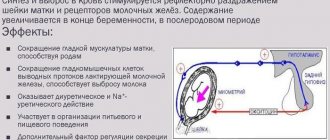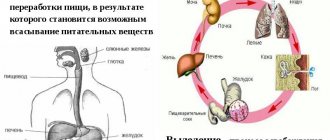Why does bile vomit occur during pregnancy?
Most often, pregnant women in the early stages feel sick in the morning as a result of a long break in eating. At this time, gastric juice is produced, causing spasms of the smooth muscles of the digestive organs. As a result of this, bile is thrown into the stomach, and then it comes out along with the digestive juice. The following causative factors can provoke this situation:
- Toxicosis. Most women experience it in the first months of pregnancy. Its signs begin to decrease and completely disappear after 3 months. If you shorten the intervals between meals and eat something immediately after sleep, you can reduce the feeling of nausea and improve your overall condition.
- Cholecystitis. A woman's chronic gallbladder disease may worsen, but due to the onset of pregnancy it can easily be confused with toxicosis. The main distinguishing feature is the appearance of discomfort after eating.
- Pancreatitis. The inflammatory process in the pancreas may make itself felt for the first time during pregnancy. This is due to the fact that the increasing size of the uterus puts pressure on the organ. In addition, a woman’s poor diet can provoke the development of inflammation or an exacerbation of a chronic process.
- Liver dysfunction. Increased stress and changes in metabolism lead to exacerbation of a chronic disease or malfunction of an organ. At risk are women who have a history of liver disease.
A change in the level of hydrochloric acid provokes a constant feeling of nausea.
In addition, vomiting with bile can develop against the background of such pathological processes:
- worms;
- intestinal infection;
- inflammation of the appendage of the cecum (appendix);
- decrease in the lumen of the small intestine;
- increased acidity.
Vomiting bile during pregnancy causes a lot of problems for a woman. Toxicosis is a problem that almost all pregnant women face. It occurs 1 to 2 times a day for several weeks. In most cases, this is a normal phenomenon that goes away over time. But if bile is present in the vomit, then most likely some disease is progressing in the body.
Bile may be present in vomit for two main reasons:
- A pregnant woman is worried about morning sickness; her stomach is still empty, so she vomits bile.
- A pregnant woman has health problems. She may have chronic diseases of the gallbladder, pancreas, liver or intestines. During pregnancy, chronic diseases can worsen.
Sometimes vomiting of bile can occur during inflammation of appendicitis, but this phenomenon occurs infrequently during pregnancy.
If the cause of vomiting is an empty stomach, then this problem will be quite simple to solve. Immediately after waking up, before taking an upright position, you need to have a small snack. I’ll also eat an apple, yogurt or drink a glass of kefir in bed.
In cases where vomiting occurs during pregnancy due to chronic diseases, you should consult a doctor. The problem requires special measures.
Vomiting with toxicosis
Toxicosis in pregnant women is often accompanied by vomiting. This disease manifests itself differently in every woman. Its duration is also not always predictable.
If toxicosis is severe, the pregnant woman is sent to a hospital, since this condition requires being under the supervision of a doctor. The risk of developing toxicosis in pregnant women increases if:
- the pregnant woman is under 18 years of age or over 35 years of age;
- a woman has a multiple pregnancy;
- there are diseases of the endocrine system;
- there are chronic diseases of the gastrointestinal tract;
- The pregnant woman experiences frequent depression, gets tired, and gets nervous.
Toxicosis is often accompanied by vomiting, but bile is not always present in it. This is facilitated by the presence of chronic diseases, which begin to worsen during pregnancy.
Cholecystitis
Cholecystitis is a serious disease that affects the gallbladder. The disease is characterized by inflammatory processes in the gallbladder. The cause of inflammation is infection and stagnation of bile. During pregnancy, chronic cholecystitis can become chronic. The reason for this is a change in hormonal levels.
- pain in the right side, under the rib;
- feeling of heaviness in the right hypochondrium;
- a feeling of bitterness in the mouth;
- heartburn.
Pain under the right rib may intensify during fetal movement. With cholecystitis, vomiting does not occur on an empty stomach, but immediately after eating fatty or fried food. That is why such foods should be excluded from the diet.
To alleviate the patient’s condition and reduce the symptoms of the disease, a pregnant woman will need to adhere to a special diet. The doctor will prescribe choleretic drugs that will not harm the fetus. You should not self-medicate. All medications should be prescribed only by the attending physician.
Pancreatitis
Pancreatitis affects the pancreas and affects its normal functioning. The symptoms of this disease are very similar to toxicosis. But pancreatitis is also accompanied by pain in the right side of the abdomen. The pain manifests itself especially clearly when women are in an upright position. When lying down, the pain goes away.
Causes of exacerbation of pancreatitis in a pregnant woman:
- increased load on the body;
- cholelithiasis;
- lack of protein;
- virus in the pancreas;
- weak immunity;
- viral hepatitis;
- consuming large amounts of vitamins.
To alleviate the condition, you need to take medications that remove bile from the body. It is better for the health of a pregnant woman if such medicines are made from natural ingredients.
Liver diseases
The liver experiences increased stress during pregnancy. This may affect her work. If a woman had problems related to the liver before pregnancy, then there is a high risk that the symptoms of the disease will make themselves felt again during pregnancy.
During pregnancy, vomiting may occur if there is a disease such as intrahepatic cholestasis.
This type of disease is characterized by a violation of the outflow of bile. During pregnancy, the risk of developing cholestasis is high, its symptoms are most pronounced in the second and third trimester. There are two main reasons why cholestasis develops:
- hormonal imbalance;
- increased load on the liver, especially during multiple pregnancies.
Vomiting of bile during pregnancy with liver diseases usually begins after eating fatty foods.
Gastritis
The disease is accompanied by acute pain and pain in the abdomen. Gastritis is manifested by the following symptoms: nausea, vomiting, diarrhea, dizziness, dry skin, abnormal stool, and a gray coating appears on the tongue.
The acidity of gastric juice during gastritis is disturbed, this is the reason for the presence of bile in the vomit.
The main treatment procedure for the treatment of gastritis during pregnancy is diet. It is necessary to strictly follow the doctor's recommendations to reduce the symptoms of the disease and alleviate the condition.
To protect the mucous membranes of the stomach and relieve pain, the attending physician prescribes special drug therapy. Decoctions of chamomile and mint have a positive effect on health. A decoction of flax seeds helps well; you can make oatmeal jelly. Taking medications without consulting your doctor is highly undesirable.
If vomiting during pregnancy occurs due to toxicosis, then this, in most cases, is not a dangerous phenomenon, the consequences of which can be eliminated. To prevent vomiting, you must take the following steps:
- follow a diet, remove fatty, sour, spicy, fried foods from the menu;
- It is necessary to eat in small portions, but more often, this way the stomach will not be empty;
- during morning awakenings, you should not rush and get up quickly, sudden movements are undesirable, awakening should be gradual;
- If possible, do not skip meals;
- when you feel the urge to vomit, you can sniff a slice of lemon; if you feel like vomiting, you can breathe over ginger;
- drink liquid throughout the day, in small portions;
- avoid overwork and stress, this will only make vomiting worse;
- You need to sleep at least 10 hours a day during pregnancy;
- It is better to avoid heat and places with high air temperatures;
- daily walks will help cope with the disease.
Toxicosis in pregnant women is an unpleasant, but passing phenomenon. If the illness persists, vomiting continues, the amount of bile in it does not decrease, you need to seek help from a doctor. Perhaps the cause of vomiting is not toxicosis at all, but a serious illness.
Hungry stomach
In the morning or during the day, an attack may occur if food does not enter the stomach for a long time. If there are too many breaks between meals, the body suffers. When food is absent from the stomach and acid continues to be produced, the smooth muscles of the abdominal cavity begin to contract. Secretion enters the stomach cavity, causing vomiting along with juice.
More often, this condition is observed in the mornings in the first trimester of pregnancy. During pregnancy in the second trimester, this condition usually ends on its own and does not require special treatment. It is recommended to avoid long breaks between meals; meals should be divided - often, but little by little.
Types of vomiting
Vomiting of bile during early pregnancy in women often occurs in the morning and is a consequence of the fact that there is no food in the pregnant woman’s stomach.
But sometimes this unpleasant phenomenon occurs due to serious diseases such as pancreatitis or cholecystitis. Therefore, a woman who experiences bile vomiting during pregnancy should immediately notify her doctor about this and undergo all examinations recommended by him. This will help not only improve the well-being of the expectant mother, but also avoid possible problems.
Prevention
It is impossible to avoid nausea and vomiting during pregnancy; every woman can reduce attacks to a minimum. It is enough to follow a diet, minimizing the consumption of fatty, spicy foods, and eliminating stressful situations and emotional stress.
Walking during this period of a woman’s life for 15 minutes, several times a day, will have a beneficial effect on intestinal motility.
Toxicosis in the early stages of pregnancy is not uncommon and does not pose a great danger. Symptoms can be alleviated. It is not recommended to start activities on an empty stomach - it is better to take care of breakfast in the evening, grab a handful of dried fruits, a banana, and cookies. When morning comes, you need to have a light snack without getting out of bed. You need to eat fruits. Girls with moderate nausea are better off eating baked fruits.
Regular examination by an obstetrician-gynecologist and timely testing will minimize the risk of diseases that cause nausea and vomiting of bile.
Features of treatment
From statistical data it is known that more than half of expectant mothers suffer from nausea with bitterness and vomiting at the beginning of pregnancy.
This happens for the following reasons:
- The body of a pregnant woman adapts to this unusual state.
- A woman’s blood contains fetal waste products until 9–10 weeks, after which the placenta interferes with this.
- Hormonal levels change.
- The sensitivity of the expectant mother is heightened.
Vomiting begins at approximately 5 weeks and sometimes lasts up to 16 weeks. Most often, this unpleasant ailment occurs in the morning, but it happens that it happens at lunchtime and in the evening.
Many factors contribute to nausea:
- sweet or fatty foods;
- unrest;
- stressful state;
- overwork, etc.
Nausea accompanied by vomiting, as a reaction to certain foods, in which salivation increases and appetite worsens, is called toxicosis.
It comes in three types:
- light;
- moderate severity;
- heavy.
In mild cases, a pregnant woman is bothered by vomiting up to 5 times a day. This mostly happens at the beginning of the day.
The average degree is diagnosed if a woman is bothered by toxicosis more than 10 times a day.
Severe toxicosis poses a serious danger to the pregnant woman and the fetus. It is characterized by constant nausea and vomiting.
The occurrence of vomiting in the later stages is much less common than in the early stages. This mainly happens closer to the 38th week, almost towards the end of pregnancy.
The root cause of this condition is the growth of the uterus, which involuntarily puts pressure on all internal organs. Banal overeating in late pregnancy causes vomiting.
Late toxicosis can negatively affect not only the condition of a pregnant woman, but also lead to oxygen starvation of the baby.
If the symptoms of nausea are mild during pregnancy, nothing special needs to be done. Activated carbon, chamomile decoction with lemon, and still mineral water help well. Moderate or complex severity of symptoms requires hospitalization. Since the effect of drugs is dangerous for the development of the fetus, their use is minimized. Sorbents, antiemetics, vitamins, enzymes and mandatory diet are allowed.
If the cause of vomiting with bile is a disease, the doctor prescribes treatment according to its degree of complexity. Therapy for intestinal infections and attacks of pancreatitis is carried out only in a hospital. Removal of intoxication, pain and relief of the inflammatory process are carried out. Acute forms of pathologies require special caution, since due to their complex course and negative impact on the child, the question of terminating the pregnancy may arise.
Pancreatitis
The signs of pancreatitis are very similar to toxicosis. Therefore, you need to be very careful about your health, paying attention to all changes in it. This disease can develop during pregnancy. The main cause of this disease is considered to be compression of the pancreas, which occurs due to an increase in the size of the uterus. Poor nutrition can also cause exacerbation of pancreatitis, which is accompanied by nausea.
During this period, pancreatitis of chronic origin may worsen in women; predisposing conditions for this may be:
- lack of physical activity,
- unhealthy diet
- liver or gallbladder disease,
- pathological effects of estrogen,
- use of certain medications,
- acute deficiency of protein structures.
In addition to attacks of nausea and vomiting, pancreatitis is accompanied by indigestion, severe pain, and dyspeptic symptoms in the stomach.
What to do? For many women, it is recommended to follow a diet, limit lipid structures in the diet, and increase the intake of protein in the body. You cannot take any medications on your own. Treatment consists of using probiotics, prebiotics, enzymes, and antispasmodics prescribed by the doctor.
Diagnostic methods
Laboratory diagnostics will determine the presence of pathological processes.
The first person to know about the appearance of vomiting with bile is a gynecologist. After this, you may need to consult with specialists who will help find out the causes and diagnose the disease. To determine the diagnosis, the following studies are carried out:
- clinical urine analysis;
- general and biochemical blood tests;
- ultrasound examination of the digestive system;
- Fetal ultrasound;
- MRI (if necessary).
Dangerous symptoms
The presence of vomiting with bile in the last stages of pregnancy is dangerous for the fetus and the expectant mother.
If vomiting occurs mainly in the morning, when the stomach is still empty, then most likely this is how toxicosis manifests itself and there is nothing to fear. According to statistics, 7-9% of all pregnant women with similar symptoms may need help in such a situation. But there are a number of symptoms, the appearance of which should alert you and serve as a signal to consult a doctor. These include the following signs:
- constant feeling of thirst;
- increased body temperature;
- sudden weight loss;
- intestinal disorder;
- fainting;
- low blood pressure;
- blood in vomit;
- dark color of urine and a decrease in its quantity.
What to do if a pregnant woman starts vomiting blood
There are some recommendations that can help you achieve some improvement in your condition:
- If you have no appetite, you should not force yourself to eat. It is better to wait a while to eat with desire and pleasure.
- If you have frequent bouts of vomiting, it is important to drink plenty of fluids to avoid dehydration. Cranberry juice, fresh apple juice, and chamomile tea with lemon help well.
- You can relieve spasms with tinctures of calendula, mint, and valerian.
- You can get rid of vomiting in the morning after waking up by taking fermented milk products in bed. It is recommended to lie down for a while after this.
- Overeating is easy to avoid if you make it a rule to eat smaller portions.
Pregnancy increases the load on the body significantly. Every expectant mother should remember this and try not to overload herself with fatty, fried, sweet, and salty foods.
- Mint or citrus lollipops and candied fruits significantly relieve attacks of nausea.
- Frequent ventilation of the living space and walks in the fresh air are useful.
- It is very important for a pregnant woman to maintain a proper daily routine and avoid overwork.
Pregnancy accompanied by vomiting with bile is a common occurrence. If a woman is unsure about the health of her digestive tract, reinsurance and exclusion of possible serious pathologies is necessary. In any case, it is important to consult with your doctor, who will help you understand this situation and prevent unwanted consequences.
Everyone knows that during pregnancy almost all girls experience vomiting associated with toxicosis. But if vomiting blood occurs during pregnancy, then this is no longer an ordinary situation.
Of course, ordinary vomiting has nothing to do with any abnormalities, but if there are bloody impurities or even clots in the vomit, then this situation requires urgent action, because this phenomenon may indicate the development of a serious pathology.
Don't ignore feeling unwell, it could be a warning sign
Concept and danger
The appearance of vomiting containing bloody spots is referred to in medical terms as hematomesis.
This process involves damage to the upper gastrointestinal tract, causing blood to mix with the vomit as it passes through the esophagus. The patient notes the appearance of mucus and bloody streaks.
As bleeding increases, blood penetrates into the stool, and melena develops - when the patient experiences frequent bowel movements of black feces.
Vomiting blood during pregnancy is always caused by some kind of traumatic damage to the mucous and vascular tissues.
Such traumatic lesions can occur against the background of many factors such as peptic ulcer disease.
Frequent vomiting with bile can also provoke the appearance of bloody impurities, because bile secretions damage the mucous tissue of the esophagus, corroding them and causing bleeding.
Usually, during pregnancy, vomiting reactions containing small bloody particles are observed, such vomiting is also called coffee grounds. This condition is safe and does not require treatment if there are no other pathological signs. This is quite possible with minor blood loss.
Depending on the type and nature of the vomit, the origin of bloody vomiting can be assumed.
- Dark vomiting occurs not only due to bleeding, but also due to specific foods eaten, such as dark chocolate or beets, some dark berries and other foods that have not had time to be digested.
- Scarlet blood in the vomit means that it has not undergone a hydrochloric acid reaction, which means its source is the esophagus;
- Vomiting with bloody foam indicates pulmonary hemorrhage;
- Vomit that resembles coffee grounds indicates the gastric origin of the blood, and it was released approximately 3-4 hours earlier. Such vomiting is often accompanied by dark, almost black stool.
- Vomiting with blood, like a fountain, is caused by esophageal varicose veins, in which a blood clot has ruptured.
- Small single thread-like bloody inclusions are usually observed in patients suffering from severe, acute toxicosis or esophageal hernial processes.
If blood appears in the vomit of pregnant women quite often, then it is necessary to urgently consult a gastroenterologist.
Causes of vomiting
Every woman dreams of giving birth to a healthy child.
In general, pregnancy cannot be a direct cause of bloody vomiting, so the etiology of this condition is associated with the same factors as in other people. Although during pregnancy such factors are provoked more often.
Typically, blood in the vomit appears in pregnant women during the first trimester, when pregnant patients suffer from toxic manifestations. With complicated toxicosis, accompanied by severe vomiting reactions, ruptures of various esophageal sections often develop (Mallory-Weiss syndrome).
But not only toxicosis can cause bloody vomit. There are other factors that cause pregnant women to vomit blood.
Moreover, the appearance of blood in masses of vomit is always associated with digestive damage, in which the vessels burst and lose their functional significance.
The root cause of blood in vomit always occurs, and most often they are pathological in nature.
Intoxication
Mothers with toxicosis often experience a state when they want to eat something unusual, right away, immediately. They are ready to eat incompatible foods and even dishes of dubious quality.
If you are so indiscriminate in your diet, you can easily get poisoned.
The cause of toxic poisoning can be the consumption of fruits containing nitrates or pesticides, and infectious poisoning is diagnosed due to the consumption of a stale product.
This condition is also dangerous because profuse vomiting and diarrhea quickly leads to dehydration, i.e. dehydration, which is extremely dangerous for pregnancy and can provoke its termination, regardless of the period of gestation. Therefore, in case of any poisoning, mommy must seek specialized medical help.
Gastrointestinal pathology
Often vomiting with bloody impurities is provoked by digestive pathologies. Usually the cause is a gastric ulcer, although other gastrointestinal pathologies are also quite possible.
Characteristic symptoms accompanying such vomiting are surges in blood pressure, abdominal pain that tends to intensify after eating or on an empty stomach, belching and heartburn, causeless nausea and dark-colored stool.
In general, bloody vomiting can be accompanied by such gastrointestinal pathologies.
- Acute gastritis. With this pathology, blood can be released from the lesions of the mucous membrane. Bleeding can be provoked by the consumption of alcohol or spicy foods, or any medications (usually anti-inflammatory drugs). To avoid vomiting blood, you must follow a diet.
- Perforation of an ulcerative lesion. The disease is characterized by the presence of acute pain at the site of the ulcer, decreased blood pressure, loss of consciousness or an excessively rapid pulse. This condition is dangerous for the patient; without appropriate help it can lead to peritonitis and even death.
- Varicose veins of the esophagus. In pregnant women it appears in the presence of liver pathologies. Bleeding thrombotic formations form on the portal vein located in the abdominal cavity. They are extremely dangerous and require immediate treatment.
- Esophageal hernial lesions. They are usually formed under the influence of the progesterone hormone, which relaxes muscle tissue, as well as under the influence of increased intra-abdominal pressure, which occurs against the background of an increase in the size of the uterine body. Because of this, the entrance to the stomach stretches, esophagitis occurs, which is manifested by heartburn, painful symptoms, and vomiting with bloody impurities.
- Duodenitis can also provoke a condition such as hematomesis. Inflammation of the duodenum is characterized by bloody vomiting, heartburn, weakness, etc. During diagnosis, Helicobacter pylori is detected, which determines further treatment tactics.
These pathologies most often become etiological factors that provoke the appearance of hematemesis in pregnant women.
Excessive food addictions often lead to gluttony, which overloads the digestive system and provokes vomiting reactions. Difficult to digest foods seriously impede the enzymatic breakdown of the food bolus.
Moreover, the enlarged uterus exerts a certain pressure on the intraorganic structures, displacing them from their place. If vomiting occurs too often, the esophageal vessels become damaged, causing blood to appear. Spasms in the stomach also disrupt the mucous membranes, causing blood loss.
These processes are accompanied by strong nausea reactions, severe malaise, etc.
Fast food and quick snacks are bad for your stomach
Cancer pathologies can appear at any time and pregnancy, unfortunately, is no exception. On the contrary, some malignant tumors, against the background of hormonal changes that occur during pregnancy, begin to actively grow and develop. Similar oncological processes are malignant lesions of the stomach, intestines, esophagus and other gastrointestinal structures.
These pathologies are characterized by chronic exhaustion, decreased performance and constant fatigue. Patients complain of pain in the abdomen, sudden attacks of nausea, a sudden onset of intolerance to any foods, or problems with bowel constipation.
But when such symptoms appear, you should not panic and self-diagnose cancer.
Such a disease can be confirmed only after a series of appropriate studies, biopsy and fibrogastroduodenoscopy.











